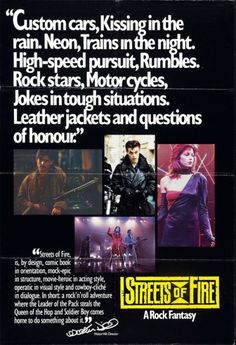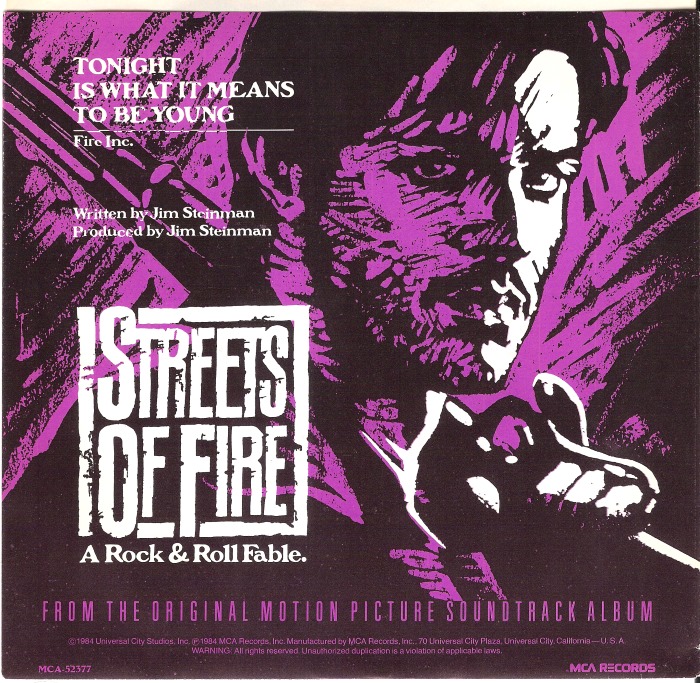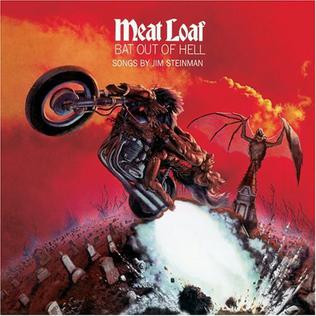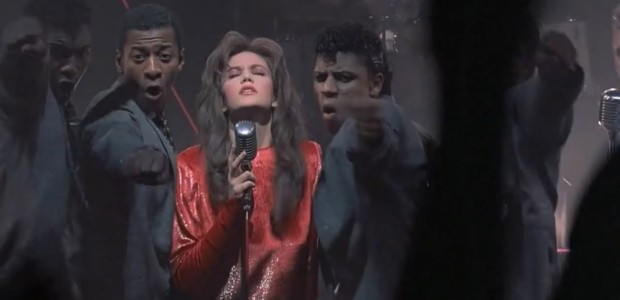STREETS OF FIRE seems like an odd passion project for writer/director Walter Hill. Known primarily for gritty ultra violence and tales of the underworld, Hill has always been a tremendous fan of comic books as well. It could be theorized that STREETS OF FIRE actually takes place in the same hyper reality of his 1979 film THE WARRIORS, leaning into that comic book inspired tone with its hyper-real, neon drenched aesthetic. Hill wrote in the press kit for the film upon its release that STREETS OF FIRE was everything the thought was cool as a teenager: “cars, kissing in the rain, neon, trains in the night, high-speed pursuit, rumbles, rock stars, motorcycles, jokes in tough situations, leather jackets and questions of honor.”
And of course rock n roll.

Even if the film fell into relative obscurity upon its release, the soundtrack to STREETS OF FIRE left an indelible mark on popular culture, if only for the top 10 hit “I Can Dream About You” by Dan Hartman, featured on the album. The slick slice of Oatesploitation (or Nü Wop or FauxTown, depending on which Beyond Yacht Rock host you trust most) was originally written for Hall & Oates who turned the song down to focus on their own material. While only credited as producer on a handful of tunes on the album, it was Jimmy Iovine acting as music supervisor that brought the ultra cool sound to STREETS OF FIRE to life. Iovine had produced records for Meat Loaf & Jim Steinman, Tom Petty, Stevie Nicks, and brought his famous friends along for the ride. Petty and Benmont Tench penned the Heartbreakers-esque “Never Be You” for Maria McKee while Stevie Nicks provided her particular style of songwriting for Marilyn Martin with “Sorcerer.” Jim Steinman’s distinct sound of course opens the film with “Nowhere Fast” performed by Fire, Inc. (a studio supergroup including E-Street band pianist, Roy Bittan). The filmmakers originally intended to close out the film with Ellen Aim (voiced by Steinman collaborator Holly Sherwood) covering Bruce Springsteen’s “Streets Of Fire” off of his Darkness On The Edge Of Town album. The entire sequence was shot but according to a 1984 issue of Film Comment, The Boss withdrew permission to use the tune when he caught wind that the song was to be re-recorded with other vocalists. It’s also been rumored that the song “Streets Of Fire” was actually cut as the filmmakers didn’t want to end the film on a downer. Film editor Freeman A. Davies cut an ending of the film to “I Can Dream About You” that according to Hill gave the film a lift, but the music supervisors wanted one more song for the soundtrack.
https://www.youtube.com/watch?v=IuSrPrJyz1k
Enter Jim Steinman to write one more song to close out the adventures of Tom Cody. Steinman penned “Tonight Is What It Means To Be Young” in two days.
“I remember, [Joel Silver] left me a great message saying, I hate you, you bastard, I love this song. We’re gonna have to do it. We’re gonna have to re-build the Wiltern Theater, which they had taken down, it was a million dollars to re-do the ending… and I felt all his hostility for Universal.”

It was a serendipitous moment for the film. While the inclusion of a Bruce Springsteen tune on the soundtrack would have certainly put more eyes on the project, “Streets Of Fire” was simply the wrong song to end STREETS OF FIRE. Springsteen and Steinman have always culled from the same influences: Phil Spector inspired pop, teenage tragedy songs, and lyrics that make getting laid a matter of life and death. Steinman and Springsteen also shared personnel with E-street band members Roy Bittan and Max Weinberg appearing on 1977’s Bat Out Of Hell album. Weinberg recorded drums for “Tonight Is What It Means To Be Young” as well.

That said, Springsteen—even at his most bombastic—always had a certain sadness, and bleak realism to his tunes. Steinman was in many ways the “comic book Springsteen,” a perfect fit for Walter Hill’s hyper real rock & roll fable. Both Springsteen and Steinman’s songs featured rebellious characters on motorcycles, it was only in Steinman’s that you picture a Frank Frazetta style demon on a “sliver black phantom bike.” These arent’ the regular guy Jersey residents that populate Springsteens oeuvre, these are four-color heroes and villains in, well, another time, another place. That operatic, over the top style was much more fitting for STREETS OF FIRE and with Steinman’s “Nowhere Fast” opening up the film, provided a perfect bookend to the film.
Jim Steinman—like Prince and Springsteen—is one of those songwriters where you immediately know you’re listening to a Steinman tune. He has a tendency to self-plagurize: the “godspeed” refrain from “Nowhere Fast” is knicked from “Bad For Good” off of his 1981 solo record and “Everything Louder Than Everything Else” off of Bat Out Of Hell II: Back Into Hell sounds like “Nowhere Fast” with a slower tempo. These are the tropes and styles that Steinman has been mining successfully for years. “Tonight Is What It Means To Be Young” features all the big, operatic choruses fans had come to expect from Meat Loaf’s muse, layered backup vocals, romantic synth lines, heavy guitars, and most importantly, that teenage sense of drama that seeing your boyfriend tonight is the only thing that really matters.
Hill and the crew returned months later to reshoot the films climax on the Universal backlot, hence Diane Lane’s wig that you will never be able to unsee. The addition of Steinman’s tune turns what could have been a bummer of an ending into a triumphant climax with Ellen Aim, her Attackers, and The Sorels joining together on stage for a final hometown show before—presumably—heading off on another adventure. It goes without saying, that Diane Lane sells it. Meanwhile, Tom Cody and McCoy ride off into a neon sunset, sure to make there way back home one more time. Why haven’t we gotten a comic book sequel to this film?
–MIKE VANDERBILT
- Vampsploitation - January 15, 2018
- Hiatussploitation - December 5, 2017
- Live From Fantastic Fest, 2017 - September 28, 2017
Tags: Bruce Springsteen, Dan Hartman, Ellen Aim & The Attackers, Music Box Theatre, Streets Of Fire, The E-Street Band, The Sorels, Tom Cody, walter hill


While not a comic, I’m sure you know about Albert Pyun’s 2008 follow-up to this, Road to Hell, right? I’m curious to see if that gets a write up within all of this Streets of Fire love. Never saw Road, but curious to read thoughts about it.